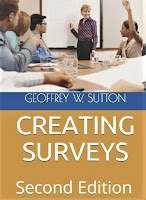Covariate. A variable that is correlated with a dependent variable in a research study. When a covariate is identified and measured, the value of the dependent variable can be adjusted for the contribution of the covariate during data analysis.
Example: If researchers collect information on the variable age in a study about forgiveness and if age is related to forgiveness, then age can be treated as a covariate to identify how people scored on a forgiveness survey after the scores have been adjusted for age.
The word adjusted is a key word to look for in reading research that includes a covariate.
Procedures that include covariates are ANCOVA and MANCOVA.
Cite this post.
Sutton, G. W. (2021, January 14). Covariate. Statistics. https://statistics.suttong.com/2021/01/covariate.html
Please subscribe to this blog for updated statistics and measures.
Applied Statistics Concepts for Counselors on AMAZON or GOOGLE
Creating Surveys on AMAZON or GOOGLE Worldwide
Links to Connections
Checkout My Website www.suttong.com
See my Books
FOLLOW me on
FACEBOOK Geoff
W. Sutton
TWITTER @Geoff.W.Sutton
PINTEREST www.pinterest.com/GeoffWSutton
Read published articles:
Academia Geoff
W Sutton
ResearchGate Geoffrey W Sutton


Comments
Post a Comment